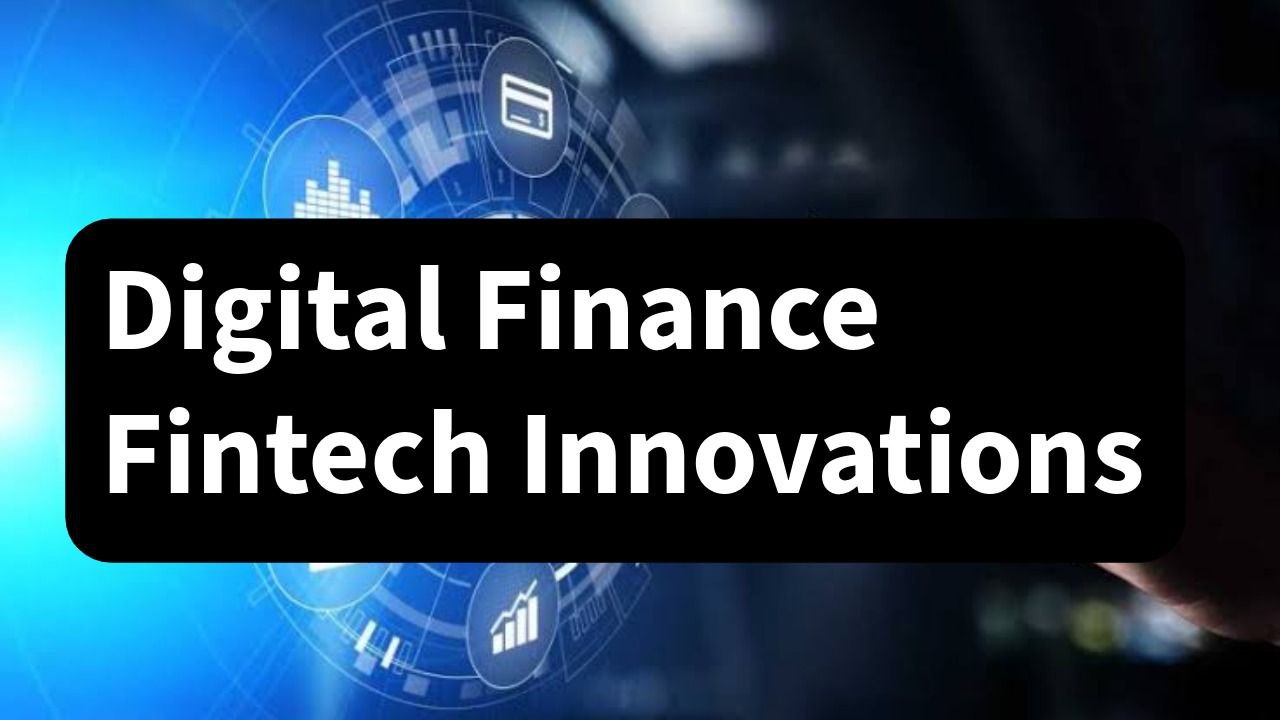Introduction:
Digital Finance Fintech Innovations Shaping the Future of Money: In the last two decades, the way people handle money has drastically changed. Traditional banking methods where customers had to visit physical branches for every service are being replaced by faster, smarter, and more accessible solutions. This revolution has been driven by digital finance and fintech innovations, which are reshaping how individuals, businesses, and governments engage with financial systems.
From mobile banking apps to cryptocurrency exchanges, AI-powered lending platforms, and digital wallets, fintech has become a critical driver of financial inclusion and economic growth. In this article, we will explore the evolution, benefits, challenges, and future of digital finance and fintech innovations.
What is Digital Finance?
- Online banking
- Mobile money services
- Digital payments & wallets
- Peer-to-peer (P2P) lending
- Robo-advisors for investment
What is Fintech?
- Payments & transfers (PayPal, Google Pay, PhonePe)
- Blockchain & cryptocurrency (Bitcoin, Ethereum, stablecoins)
- Digital lending & credit scoring
- Investment platforms (Robinhood, Zerodha, Groww)
- Insurtech (digital insurance platforms)
Evolution of Digital Finance & Fintech
- Early 2000s: Online banking and internet payments emerged.
- 2010s: Rise of smartphones boosted mobile wallets like Paytm, Alipay, and Apple Pay.
- 2015 onwards: Growth of blockchain, cryptocurrencies, and peer-to-peer lending.
- 2020s: Artificial Intelligence (AI), Machine Learning (ML), and Big Data started driving credit scoring, fraud detection, and personalized investment advice.
- 2025 and beyond: Central Bank Digital Currencies (CBDCs) and embedded finance are shaping the future.
Key Innovations in Digital Finance & Fintech
- Mobile Payments & Digital Wallets: Apps like Google Pay, Paytm, and Apple Pay allow instant transactions without cash or cards. These wallets are integrated with UPI (Unified Payments Interface) in countries like India, making payments seamless.
- Blockchain & Cryptocurrencies: Blockchain technology ensures transparency, decentralization, and security. Cryptocurrencies like Bitcoin and Ethereum have changed how people view money, while NFTs (Non-Fungible Tokens) are transforming asset ownership.
- Artificial Intelligence & Machine Learning: 1)Fraud detection 2) Customer service (chatbots) 3)Personalized investment advice (robo-advisors) 4)Credit scoring for loans
- Peer-to-Peer Lending & Digital Credit: Platforms like LendingClub and Faircent connect borrowers directly with lenders, reducing dependence on banks. AI-based credit models allow loans for individuals without formal credit history.
- Insurtech Innovations: Insurance companies now use big data, IoT devices, and digital claims processing to simplify customer experience. Example: health trackers influencing premium rates.
- Central Bank Digital Currencies (CBDCs): Many countries, including India, China, and the EU, are exploring CBDCs digital versions of national currencies regulated by central banks. This could revolutionize payments while reducing reliance on physical cash.
Benefits of Digital Finance & Fintech
- Financial Inclusion: Fintech has brought banking access to rural populations and unbanked individuals who previously lacked opportunities. Mobile banking is a game-changer in developing economies.
- Convenience & Speed: Transactions that once took hours or days are now completed in seconds with mobile payments and instant transfers.
- Lower Costs: Digital platforms eliminate the need for physical branches, reducing transaction fees and making financial services more affordable.
- Transparency & Security: Blockchain ensures transparent records, while AI reduces fraud risks.
- Global Reach: Fintech platforms allow cross-border payments and international investments with minimal effort.
Challenges in Digital Finance & Fintech
- Cybersecurity Risks: Digital platforms are vulnerable to hacking, phishing, and data theft. Strong cybersecurity measures are essential.
- Regulatory Concerns: Governments struggle to create policies that balance innovation and consumer protection. Cryptocurrency regulations remain a hot topic worldwide.
- Digital Divide: Rural and low-income populations may face challenges due to lack of internet access and digital literacy.
- Privacy Issues: The collection of personal financial data raises concerns about misuse and surveillance.
- Market Competition: Traditional banks vs. fintech startups often leads to conflicts over customer trust and market dominance.
The Future of Digital Finance & Fintech
- Embedded Finance: Financial services will be integrated into non-financial platforms (e.g., ride-sharing apps offering instant loans or e-commerce sites providing insurance).
- AI-Driven Finance: AI will play a greater role in personal finance management, fraud detection, and wealth management.
- Green Fintech: Sustainable finance solutions will emerge, such as carbon tracking apps and green investment platforms.
- Cryptocurrency & Web3: As blockchain matures, decentralized finance (DeFi) and Web3 applications will become mainstream.
- Government-Backed Digital Currencies: CBDCs will likely replace physical cash in many countries, providing a regulated, stable, and efficient digital currency system.
Real-World Examples of Fintech Success
- PayPal – Revolutionized online payments globally.
- Paytm (India) – Brought digital payments to millions of Indians.
- Square (USA) – Empowered small businesses with easy payment solutions.
- Ant Group (China) – Built the world’s largest fintech ecosystem.
- Revolut (UK) – Offers global banking, currency exchange, and crypto services.
Important Links:
| World Bank – Digital Finance Overview | Click Here |
| International Monetary Fund (IMF) | Click Here |
Conclusion:
The rise of digital finance and fintech innovations is not just about convenience. it is about creating an inclusive, secure, and efficient financial ecosystem. While challenges like cybersecurity and regulation remain, the benefits far outweigh the risks. As technology evolves, fintech will continue to push boundaries, making money management smarter, faster, and more accessible to people around the world. The future of finance is undoubtedly digital-first, and those who embrace this transformation will thrive in the modern economy.
